Lying while Thais are dying
Thailand's Ministry of Foreign Affairs should be focusing on vaccine diplomacy to secure desperately needed doses. Instead it's just churning out ultraroyalist propaganda.
With Thailand staring into the abyss of a coronavirus catastrophe, ranked the equal worst performing country in the world alongside Vietnam out of 120 surveyed for the Nikkei Recovery Index, with people literally dying in the streets, and the country boiling with anger at the regime’s disastrous mishandling of the pandemic, the once respected Ministry of Foreign Affairs decided this would be a great time to publish a ridiculous propaganda article claiming the monarchy is working tirelessly to save the kingdom from covid-19.
The story, entitled “A Modern Monarch in Action: Mobilising Relief in a Pandemic” was published with the byline of deputy permanent secretary Tana Weskosith, a former ambassador to Italy. In fact, it was written by junior staff but a senior diplomat’s name was required to give it a spurious sense of authority, and unluckily for Tana, he was chosen. In usual circumstances, the article would have been under the name of Tanee Sangrat, the director general for information at the ministry, but his credibility has been so damaged by his vigorous support for the lèse majesté law that Tana was picked instead.
According to sources within the ministry, who are deeply embarrassed about it, the article was intended as a rebuttal to my analysis on the palace and the pandemic published recently in English and Thai.
The article can be seen on the Thailand Now website, a PR operation run by the ministry which hardly anyone ever reads. They have 13,418 followers on Facebook and just 958 on Twitter, which is really not enough to justify the money Thai taxpayers spend on this dismal initiative. It’s a bit crass to compare social media numbers but these statistics are a reasonable indication of readership. Thailand Now is a state-financed media operation while I am just a freelance journalist funded solely by my readers, with a fraction of the ministry’s budget, but I have 26 times more followers on Facebook and 302 times more on Twitter than they do.
The “Modern Monarch in Action” article is a spectacular trainwreck from start to finish, an embarrassment for any credible democratic country in the 21st century. It’s also almost unreadable so to save you the trouble if you can’t face it, here are some of the lowlights.
Firstly, the whole concept of a “modern monarchy” is absurd in relation to Thailand. Besides his wife, King Vajiralongkorn has also appointed an official consort, in a grim setback for the rights of Thai women, the first monarch to do so since King Vajiravudh who died in 1925. Vajiralongkorn usually spends his time living in a luxury hotel in Germany with a harem of more than 20 concubines, and he has a special prison and punishment camp at one of his palaces near Bangkok where he can torment anyone who displeases him.
He’s not modern. He’s medieval.
Second, is Thailand a competent and confident 21st century country with the expertise and resources to do its best to combat the pandemic, or are Thais just useless without the help of the glorified royals?
The article claims that:
Building on this royal legacy to observe and support the needs of society, Their Majesties the King and the Queen have continuously monitored the COVID-19 situation with concern since the very beginning of the outbreak in Thailand last year, knowing that the impact upon the population was complex and would last for years to come.
Actually, at the start of the crisis Vajiralongkorn sought special permission to remain at the Grand Hotel Sonnenbichl in Bavaria with his harem, while Suthida was living a separate life at a hotel in Switzerland. They hardly spent any time in Thailand at all until October.
Claiming Vajiralongkorn has been constantly monitoring the situation and analysing how to help is just an insultingly absurd thing to say.
The obvious implication is that without the (completely fictitious) tireless involvement of the royals, Thailand would be facing a much worse situation. But Thai diplomats have been claiming for years that the monarchy is just symbolic. So how come the Thai government and civil service can’t cope with a pandemic without royal involvement? Is Thailand incapable of dealing with a crisis unless the palace is brought in to handle it?
Who is actually in charge? In a normal constitutional monarchy, the royal family would give symbolic moral support during a crisis, rather than spending the first several months more than five thousand miles away at luxury hotels on a different continent, and it would be the job of the government to handle the logistics of providing the necessary healthcare and vaccines to the population.
But the article claims the royals have been at the forefront of responding to the pandemic.
To assist the government in tackling the crisis, Their Majesties’ contributions were multifaceted and well-thought out, bringing meaningful impact across high-risk communities nation-wide. These include donations of essential life-saving medical equipment and supplies to prevent, test and treat patients, as well as relief to alleviate economic and social adversities, and even support for children-turned-orphans whose parents succumbed to the disease. Most recently, donations have also been extended to finance the setting up of field hospitals, community isolation centres, and quarantine sites all over the country to help reduce the burden of hospitals in treating COVID-19 patients.
Why is a supposedly ceremonial royal family having to play this role? As I explained in my analysis of the debacle:
Thai royalists have never accepted the 1932 revolution that ended the absolute monarchy, and have never given up fighting to reverse it. A central part of this struggle involves relentless palace propaganda presenting the royal family as doing all the work to develop the kingdom and solve its problems, in contrast to avaricious and incompetent politicians who just cause more problems and never achieve anything.
It’s extraordinary to see the Ministry of Foreign Affairs promoting the idea that a competent Thai government would be incapable of dealing with the crisis without the help of the monarchy.
The article also proclaims that the royals have made a generous financial contribution: “The value of contributions which came from Their Majesties’ personal funds are estimated at 1.3 billion baht.”
Even assuming this figure is true, which is unlikely, a reasonable estimate of the wealth of the Thai monarchy is at least $80 billion. Thailand’s taxpayer-funded 2021 defence budget is 223.4 billion baht and the amount of money being transferred to the royals in 2021 is 37.2 billion baht. So a contribution of 1.3 billion baht would just be a fraction of what the monarchy and military are embezzling this year.
It’s a terrible insult to Thais to claim that they should be grateful to the palace that a tiny share of the tax money they paid to the royals was used to buy some medical equipment, while the military and monarchy suck up vast funds and have expensive PR operations to claim they are saving the kingdom.
The third agonising aspect of the article is the surreal rewriting of history:
Friends of Thailand might be familiar with anecdotes about the Thai monarchy that has stood fast alongside the Thai people through thick and thin — from combatting poverty throughout the ages to fighting the COVID-19 pandemic since last year. Their Majesties the King and Queen, like their forefathers, have continued to take this mission on board in all types of situations, whether they be during a crisis or in times of peace. Their mission to alleviate any sort of suffering that may befall the people, and to improve the people’s quality of life, education and health, is a serious one — one that has been upheld as a solemn oath to the people, a life-long legacy that was passed down from erstwhile generations of kings.
Slavery in Thailand was finally abolished in 1915. The many generations of Thais who existed in literal servitude to despotic kings would have been astonished to learn that their monarchs had sworn a solemn oath to alleviate their suffering and improve their lives.
A more honest account of how Thai royals treated ordinary people was published in 1932 by a British scholar called H.G. Quaritch Wales who worked in the Lord Chamberlain’s Department in the Siamese royal court as an adviser to Rama VI and VII. In his study of Thailand, Siamese State Ceremonies; Their History and Function, he wrote:
In Old Siam the inhabitants of the country were considered only as the goods and chattels of the king, who had absolute power over their lives and property and could use them as best suited his purpose. Otherwise they were of no importance whatever...
It’s worth noting that Quaritch Wales was by no means progressive — he supported the absolute monarchy in Thailand — but at least he was honest about what it actually entailed.
Fourth, the reflexive sexism —while the article dutifully mentions Queen Suthida, and praises the contribution of Vajiralongkorn’s paternal grandmother Sangwan Talapat and sister Princess Chulabhorn, it presents a view of history in which all the real achievements were made by the “forefathers” of the current royals.
Fifth, the article tries to claim that the decision to get royal company Siam Bioscience to manufacture the AstraZeneca vaccine for Thailand is evidence of the greatness of the monarchy, when in fact it has been glaringly clear for months that this was a disaster that left the kingdom far behind its neighbours because Siam Bioscience only began delivering doses in June and can only give Thailand five to six million a month, far fewer than required.
Even obsequious royalists like prime minister Prayut Chan-ocha and public health minister Anutin Charnvirakul have stopped trying to use the Siam Bioscience fiasco to promote the monarchy but it seems the foreign ministry didn’t get the memo.
My article on the disaster explains all this in detail but if you want another credible source who (like me) is not constrained by the lèse-majesté law, Craig Keating, a former senior analyst with Australia’s Office of National Assessments, observed in an analysis that Thailand’s “decision to contract with Siam Bioscience — a company owned by King Vajiralongkorn with no experience in making vaccines — to make the AstraZeneca vaccine under licence probably delayed the supply of vaccines in the large numbers needed”,
Sixth, the article praises Chulabhorn’s decision to circumvent government rules and procure Sinopharm doses from China to sell at cost to Thais. But in any properly-run country, it’s not the role of a princess to unilaterally override the regulations of the government in the middle of a pandemic and then sell vaccines at no financial loss to herself while also relentlessly promoting her generosity. This whole bizarre episode is another example of the dysfunction of the Thai regime. It is really nothing to boast about.
Seventh, the article totally whitewashes the government’s failings, claiming many countries faced the same issues:
Thailand, as with many other countries, is temporarily facing a shortage of vaccines. This can be attributed to inequitable distribution of vaccines around the world, as well as an overall shortage of vaccine supplies, caused by circumstances in the global vaccine industry and supply chains as acknowledged by the World Health Organisation. On its part, the Thai Government is also doing all it can, leaving no stones unturned and working closely with both the public and private sectors of other countries to procure more vaccines.
One simple chart can show that’s a lie. Let’s look at the share of people vaccinated on May 1, as the Delta variant was beginning to cause havoc. Even Laos was doing better.
There is hardly anything in the article that is true. It’s just a painfully badly-written bunch of lies, and as I explained in my analysis of what happened in Thailand, the obsession of government officials with focusing on propaganda rather than tackling the crisis is the biggest reason for the disaster.
The tragedy of the Thai foreign ministry is that this kind of blatant and clumsy dishonesty has become routine, and even genuinely talented diplomats have to do it if they want to get ahead.
Everybody knows that diplomats have to lie sometimes, or at least be strategic with the truth, but one of the main jobs of Thai ambassadors is to be outrageously dishonest, and in particular to write mendacious letters to newspapers to promote palace propaganda.
This is totally counterproductive because it just makes senior Thai diplomats look stupid, and in the 21st century hardly anyone reads the letters to the editor of newspapers anyway, so why destroy your credibility by doing it?
I’ve spoken to several talented current and former ambassadors who have had to reluctantly do it, and the reason is that the monarchy and their bosses demand it. In Thailand, the palace can prevent any story being published by mainstream domestic media just by making a phone call to the editor. This still happens all the time. Palace officials can’t understand why the same can’t be done in countries with a genuinely free press, and every time they see an article they don’t like in a foreign publication, they demand action.
This has been going on for many decades. In my research at the British national archives in Kew, looking for interesting Thai-related documents, it’s remarkable how many times I’ve found exchanges of correspondence in which Thai diplomats complain about UK media articles, and British diplomats try to politely explain they can’t tell newspapers and magazines what they can or can’t write.
One example from seven decades ago followed the publication on February 24, 1951, of an article in the left-leaning British political news magazine The New Statesman and Nation about the trial of three men for the murder of King Ananda Mahidol in June 1946.
The article (correctly) noted that the Thai regime that had seized power in a military coup in November 1947 was trying to falsely implicate former senior statesman Pridi Banomyong in the king’s death, and that no direct evidence had been presented to demonstrate the guilt of Pridi or of the three scapegoats standing trial. It added that the trial was being held “primarily for propaganda purposes”.
All of this was true, but Suan Navarasth, the Thai ambassador in London, whose honorific title was Phra Bahidda Nukara, was ordered to take action. A copy of the article, with annotations from Suan showing the passages he found most offensive, can be found in the UK national archives.
Suan demanded action, and British diplomats told him to contact the magazine’s editor, Kingsley Martin.
Martin refused to correct the article, as Suan was trying to insist, but said that if the Thai government wanted to write a response, the magazine would publish it.
This response was duly printed in the June 23 edition of The New Statesman and Nation. Unfortunately for the Thai ambassador, his letter clumsily claimed that “investigation and evidence confirm the charges” against Pridi and the other accused, forgetting that a trial was currently under way that was supposed to determine whether or not the charges were true, and in democratic countries guilt or innocence can’t be dictated by the regime.
The whole point of the New Statesman and Nation article was that this was a show trial in which unfortunate scapegoats were being blamed for a crime they did not commit regardless of due process, and Suan’s attempted rebuttal accidentally showed that this was indeed true.
Martin made this clear in his response to the ambassador’s letter, which was printed alongside it:
Never did a Government so completely give itself away. While the trial is still in progress the Thai ambassador states that “subsequent investigation and evidence confirm the charges” against the accused men and adds “there is no question of supposition”! In short, by his own admission, the accused have been selected as victims, the charges privately “confirmed”, and the trial is a farce which is to lead to their condemnation.
Martin also mentioned allegations of torture against the three accused who were on trial, and added that the claim that Pridi had anything to do with King Ananda’s death was “notoriously a piece of political warfare”.
You can see his response to the right of Suan’s letter below.
This of course caused further outrage in Bangkok, and the hapless ambassador Suan was ordered to approach the British Foreign Office again to seek official help from the UK government to deal with the upstart editor who was refusing to believe the dishonest Thai claims about the death of King Ananda and the fairness of the trial.
British officials told the ambassador that there was nothing they could do — the United Kingdom allowed freedom of the press.
Rather pathetically, the Thai ambassador said he “fully understood” but requested an official letter from the British to say so, which he could show to his superiors in Bangkok as an excuse for his inability to resolve the matter.
Since the 1950s, nothing much has changed. When something offensive to the monarchy is published by a newspaper or magazine abroad, Thai ambassadors are ordered to deal with it, and they have to show some evidence of having done something even if they know it’s futile. So they write angry letters to the editor.
Over the past few decades, three issues above all preoccupied the palace. The first is Article 112, an obscene law that criminalises telling the truth about the monarchy. Thai ambassadors are routinely told to respond to articles about the lèse majesté law by claiming it reflects Thai traditions and doesn’t really impact freedom of speech at all. While it’s true that the law is indeed part of the longstanding tradition of the monarchy to crush any dissent, pretending it doesn't impact freedom of speech is absurd.
After I resigned from Reuters in 2011 to publish #Thaistory, my analysis of thousands of leaked US cables, The Times published a front page story on it, focusing on the worries about King Bhumibol’s declining health and royal succession, plus the speculation of American diplomats (almost certainly correct) that Vajiralongkorn has HIV. The story also mentioned how my article violated the lèse majesté law.
Kitti Wasinondh, the ambassador in London, had to respond with a daft letter claiming Bhumibol was fine and that the law reflected “our tradition and reverence towards our monarchy”.
Letters pages in global newspapers are littered with similar claims by Thai ambassadors defending the lèse majesté law. Here is a particularly egregious one from another Thai ambassador to London, Pisanu Suvanajata, in 2020, making claims so absurd that he must surely have known they were nonsense:
First, there is no such thing as a legally enforced code of silence on his majesty the king and it is not illegal to discuss the monarchy…
Second, the lèse majesté law is not aimed at curbing people’s rights to freedom of expression or the legitimate exercise of academic freedom or debates about the monarchy as an institution.
This elicited a robust rebuttal from dissident Chupong Theethuan which was also printed in the newspaper. Here’s an extract.
The second issue that ambassadors were regularly instructed to complain to newspapers about was royal wealth. Back in 2008, Forbes magazine began publishing an annual list of the world’s wealthiest monarchs. Bhumibol was always number one on the list, with estimated wealth of $35 billion in 2008, reduced to $30 billion in 2009 because of the global economic crisis. Based on the Forbes figures, Bhumibol also began appearing in the Guinness Book of Records as the world’s richest monarch.
This was intensely embarrassing for the palace because Bhumibol had always pretended to be a frugal king who lived simply and didn’t care about money. He had spent years promoting a philosophy of “sufficiency economy” that told Thais they should avoid seeking excessive wealth. His own vast riches exposed this as pure hypocrisy.
Thai diplomats spent years denying that Bhumibol was wealthy. In regular letters to the media when an article mentioned royal riches, they insisted the assets of the Crown Property Bureau belonged to the nation, not to the king, and therefore should not be counted in estimates of his wealth.
A letter sent to Forbes in 2012 by Arjaree Sriratanaban, minister-counselor at the Thai embassy in Washington, is a typical example.
She claimed it was inaccurate to “include assets belonging to the CPB, which are held in trust for the nation, into its calculation of the King’s personal wealth” and added a paragraph of typical royalist propaganda about the king’s hard work and down-to-earth lifestyle:
Lastly, in contrast to an ultra-rich image that Forbes has tried to portray of the Thai monarch, anyone who knows Thailand and has driven by Chitralada Palace in Bangkok can clearly see the agricultural research station His Majesty has built upon the palace grounds. The laboratory serves as an incubator for ideas of over 4,000 Royal Development Projects in communities throughout the country. His Majesty’s palace is probably the only monarch’s residence in the world to be adorned with demonstration rice fields, fish ponds, a cattle barn, a rice mill and several small factories.
In fact, however, it was simply not true that the assets of the CPB belonged to the nation.
After the revolution of 1932 that ended the absolute monarchy, Siam’s new leaders took control of the assets of the Privy Purse Bureau — the precursor of the CPB — and slashed the annual payments to the royal family, something that made King Prajadhipok so unhappy that he eventually abdicated. The Crown Property Act of 1936 formally put the government in control of most royal assets.
But in 1948, with the royalists resurgent again, the Crown Property Act was amended to restore full control over royal assets to the king. The amended law made clear that the assets of the Crown Property Bureau could be used by the king “at his pleasure, in any way at all”.
This has always been clear to anyone who actually bothered to read and understand the amended law, but royalists spent decades denying it.
Any doubts were decisively dispelled on June 16, 2018, when Vajiralongkorn explicitly announced his full personal ownership of the CPB fortune.
The Thai regime made no objection, and no Thai ambassador bothered to write a letter to the media admitting that they had been lying all this time about the assets belonging to the nation rather than the king.
But ambassadors continue to write ridiculous letters to protect the palace. The third issue that the monarchy has been fretting about above all — and the most important nowadays, after it’s already widely known they lied about lèse majesté and royal wealth — is the behaviour of Vajiralongkorn.
Since 2007, Vajiralongkorn has mostly been on a long holiday in Germany, and over the past five years he spent most of his time at the Grand Hotel Sonnenbichl in the Bavarian mountain resort of Garmisch-Partenkirchen, with a harem of more than 20 women. For decades most international media were so afraid of the lèse majesté law that they avoided writing anything negative about the Thai monarchy, but in recent years Vajiralongkorn’s behaviour became so egregious that they started taking an interest, and reporting by people like Somsak, Pavin Chachavalpongpun and me made the issue impossible to ignore.
So Thai diplomats have been forced to regularly write letters to the media full of more outrageous lies.
Here’s another from the ambassador in London, Pisanu Suvanajata, after The Times reported my research about Vajiralongkorn’s life in Bavaria. It makes the absurd claim that the Thai prime minister is more powerful than the king, who “reigns but does not rule, undertaking only ceremonial and representative duties as required by the constitution, custom and tradition”. It also talked about Vajiralongkorn’s “visits” to Germany as if these were just sporadic trips, failing to acknowledge that until the pandemic he lived in Germany and hardly ever visited Thailand at all.
A recent article in Nikkei Asia by longtime Bangkok-based journalist Marwaan Macan-Markar discussed how the regime’s missteps on coronavirus policy had led to speculation that another coup is imminent:
By mid-July, as the economy continued to flounder, the possibility of a coup had moved from social media chatter to serious discussions in elite business circles.
So of course, another pointless letter had to be sent, this time by Singtong Lapisatepun, the Thai ambassador to Japan. It was published on August 5. Here is what Singtong said:
Claims that there are "corpses lying around the capital" could not be further from the truth. Nothing of the sort happened. Although Thailand has become among the 130 countries whose public health system has come under enormous strain due to the spread of the COVID-19 delta variant, we have not succumbed to the disease.
Government agencies, the private sector and civil societies are redoubling their efforts to strengthen the capacity of our public health system. Despite the fact that the current COVID-19 death rate has risen during this current wave of infection, it is still well below the global average.
The Thai government remains steadfast in its vaccination campaign, attaching the highest importance to the safety of medical personnel and other at-risk groups, with more than 17.6 million doses of vaccine administered since February 2021 despite the shortage of global vaccine supplies and the fact that vaccines are unevenly distributed across developed and developing nations.
His Majesty the King has remained nonpartisan and above politics, abiding by his role as a constitutional monarch. However, being above politics does not mean the king cannot be involved in bringing relief to the people who are currently suffering due to the COVID-19 situation.
Since last year, the king has donated his personal funds for the purchase of medical equipment, including lifesaving ventilators, biosafety vehicles used for testing and other necessary medical supplies to combat the spread of the virus, along with other charitable actions such as sponsoring education for children whose parents have succumbed to COVID-19.
As with other democracies, the Thai experience has had its missteps and false starts, including coups d'etat. But Thai people have always remained steadfast on the path of democracy, introducing more effective and improved checks and balances. The current constitution was approved by a nationwide referendum.
The Royal Thai Army has duly taken legal action against fearmongers whose irresponsible actions of spreading rumors about a coup d'etat caused public confusion. Such flagrant violation of the law is particularly stark in the midst of a pandemic, where public attention should be focused on fighting the disease, not falling prey to an infodemic.
Creating false information by interweaving random historical facts and half-truths borders on sensationalism.
It’s really sad to see Thai ambassadors reduced to the role of paid liars for the palace, making fools of themselves by peddling obvious untruths.
The Ministry of Foreign Affairs really does employ many of the best and brightest of Thailand, and a lot of them have been exceptionally helpful to my work over the past decade, at great personal risk to themselves. I’ve also had many interesting conversations over the years with brilliant young Thais studying abroad on Ananda Mahidol scholarships who have a huge amount to contribute to their country, many of whom later became diplomats. We could never acknowledge we had ever met or talked, because they would have had their scholarships cancelled and their future ruined.
What’s even sadder about it is that for generations, Thais were recognised for excellent diplomacy, and it’s terribly depressing that the Ministry of Foreign Affairs has now just become the external propaganda wing of the palace.
My message to all Thai diplomats is this. Is it still worth it? What are you fighting for? Aren’t you embarrassed about lying like this? What do your children think of you? Isn’t it time to say enough is enough, and do the right thing?
A recent study by the Thailand Development Research Institute showed how six comparable countries — Indonesia, Malaysia, Philippines, Singapore, Israel and Brazil — all achieved their vaccine procurement targets far ahead of Thailand largely thanks to diplomacy and leveraging their geopolitical influence.
This is what the kingdom’s diplomats should be focusing on, instead of lying as Thais are dying.
If you’re new to Secret Siam, it’s a newsletter focused on Thailand that is fully funded by reader subscriptions and aims to publish exclusive news and analysis that can’t be found anywhere else. It’s just $5 a month to sign up, or less if you pay annually. You can subscribe at this link:
Thank your for your support. 🙏


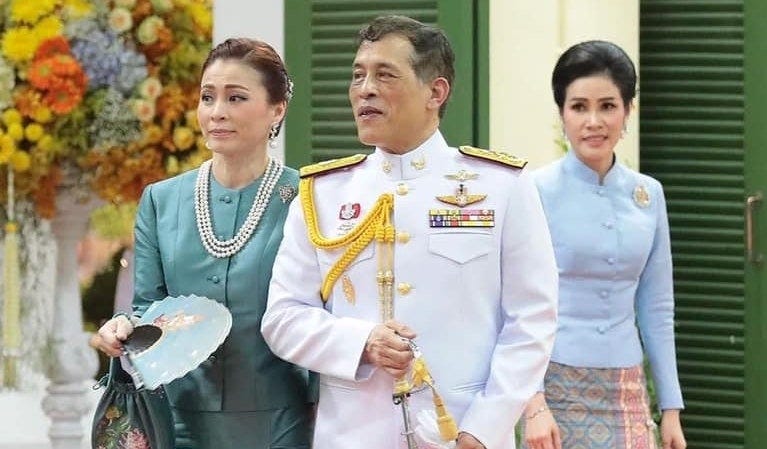
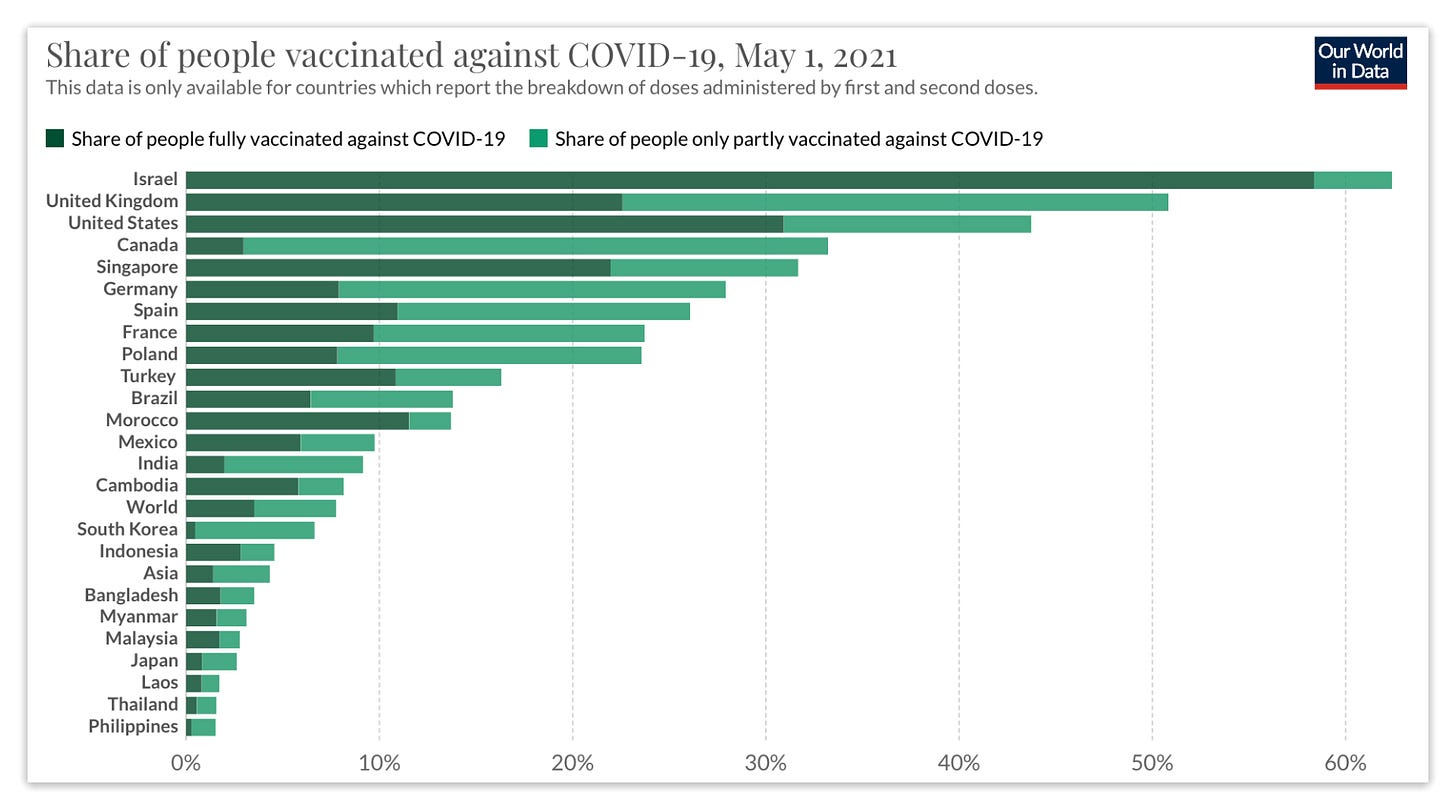
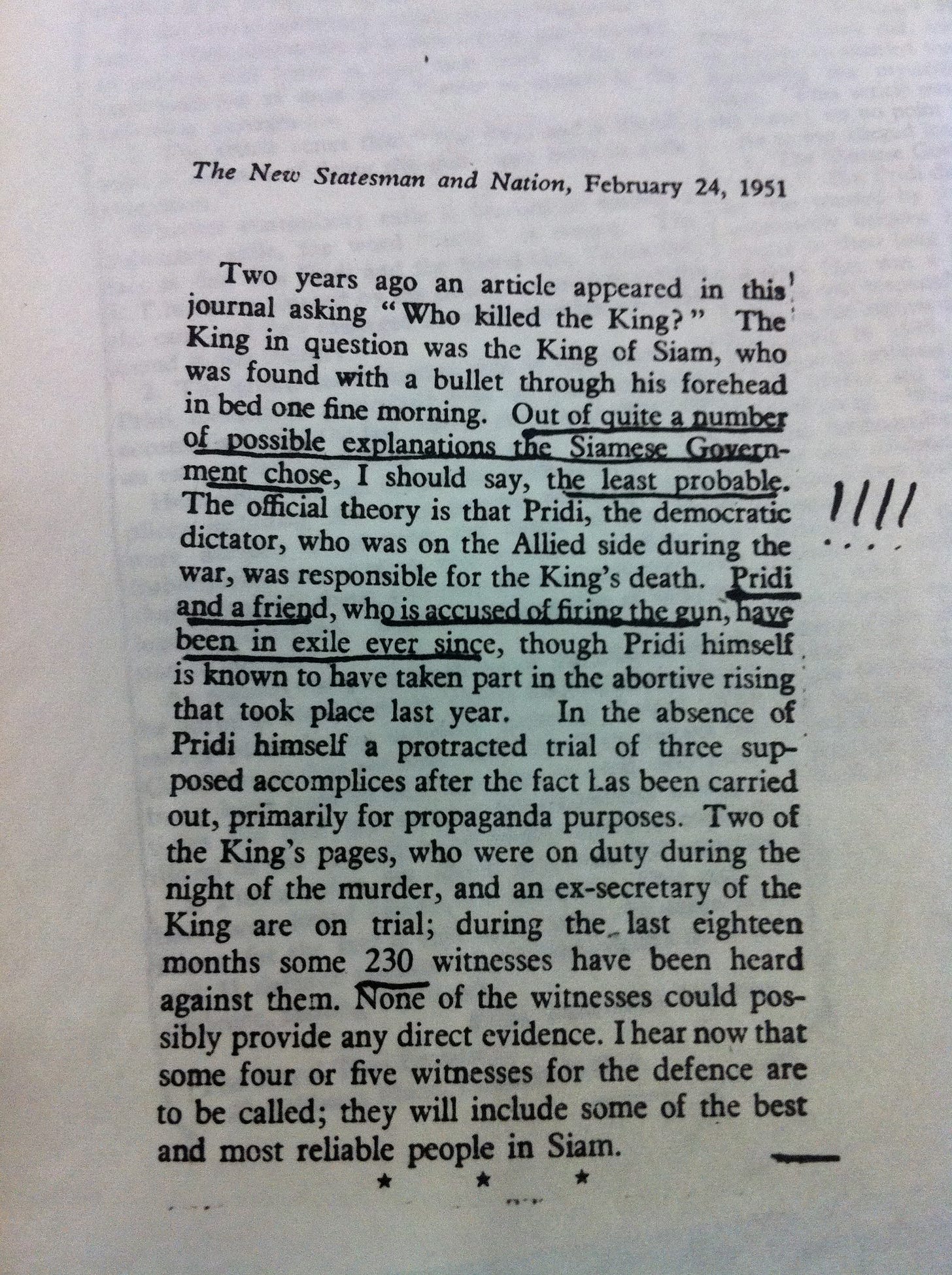
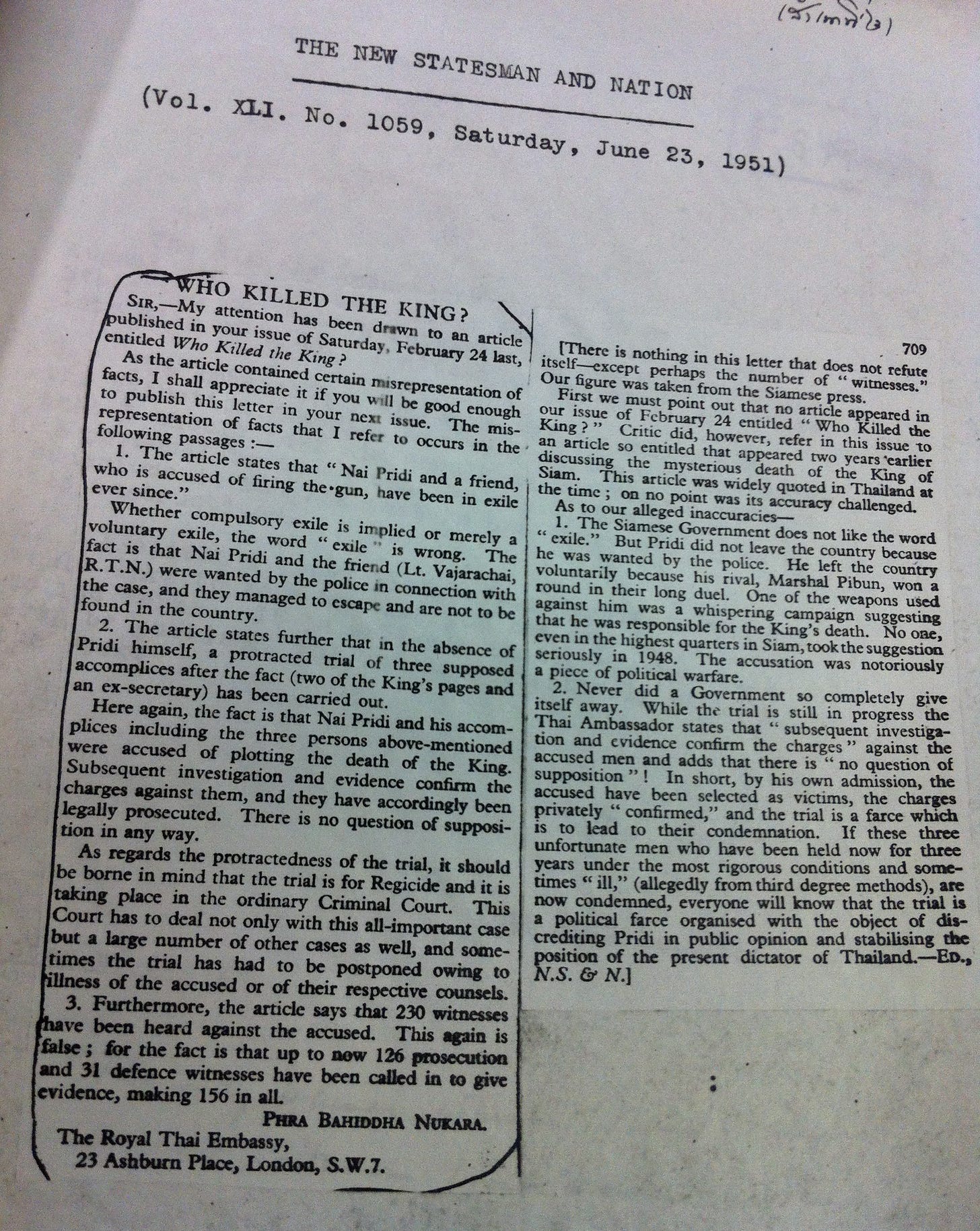
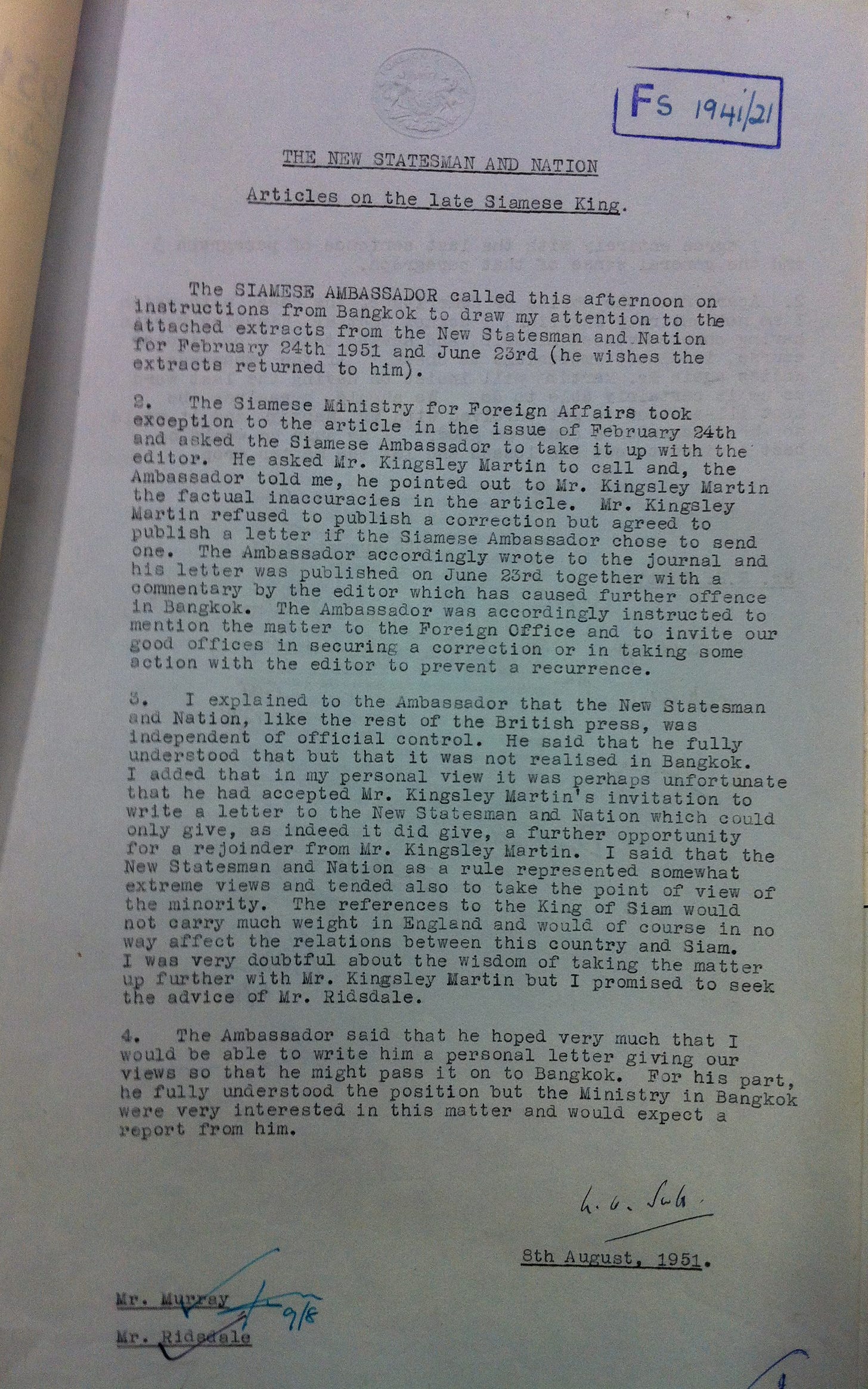
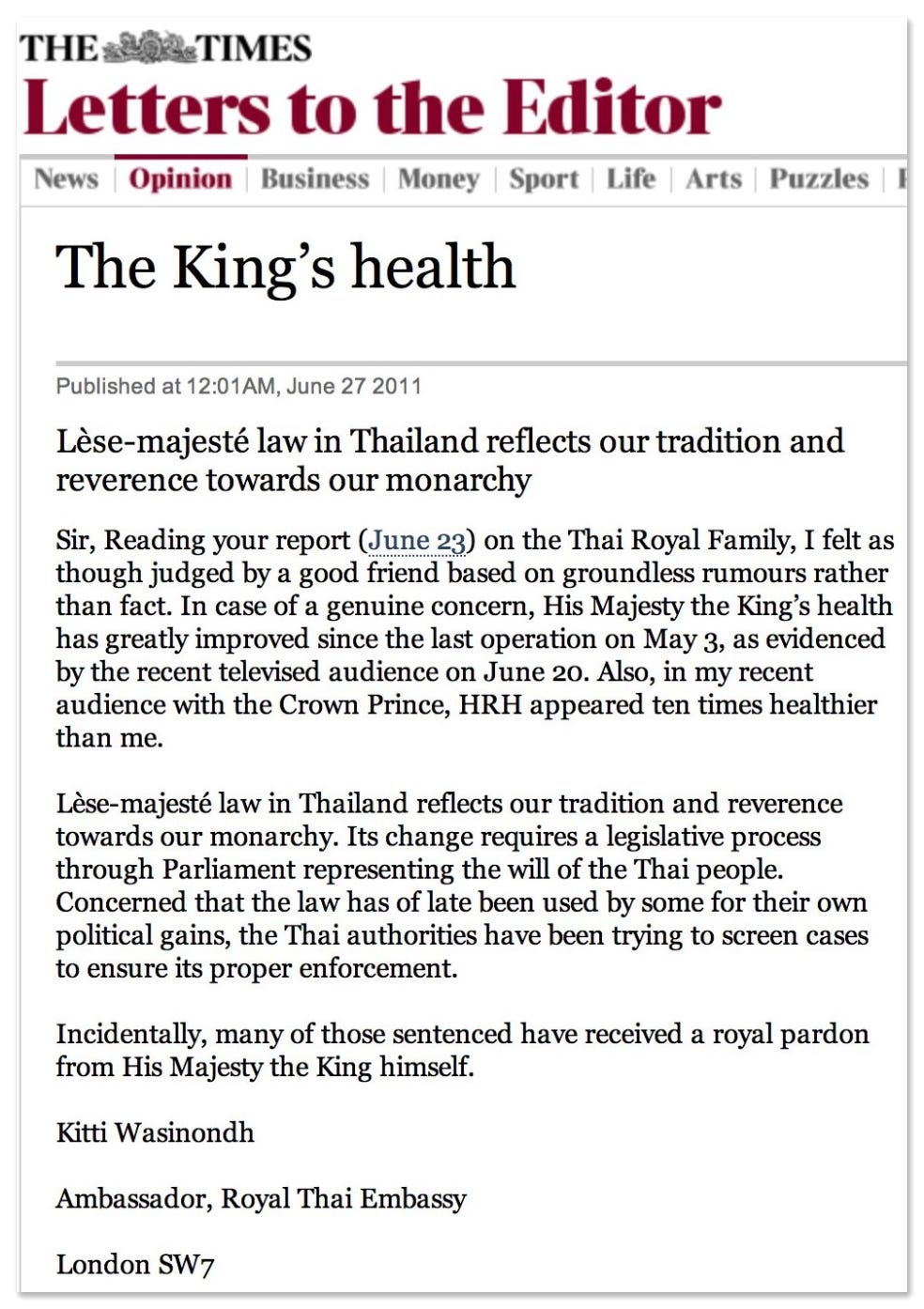


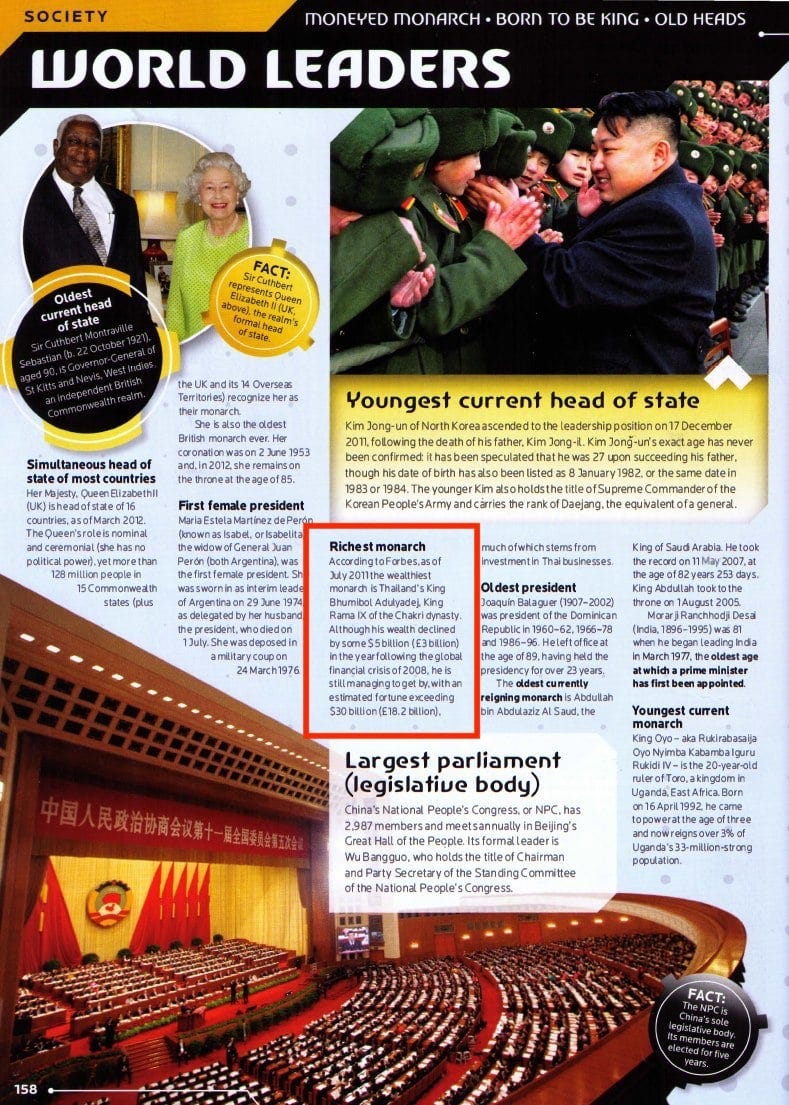
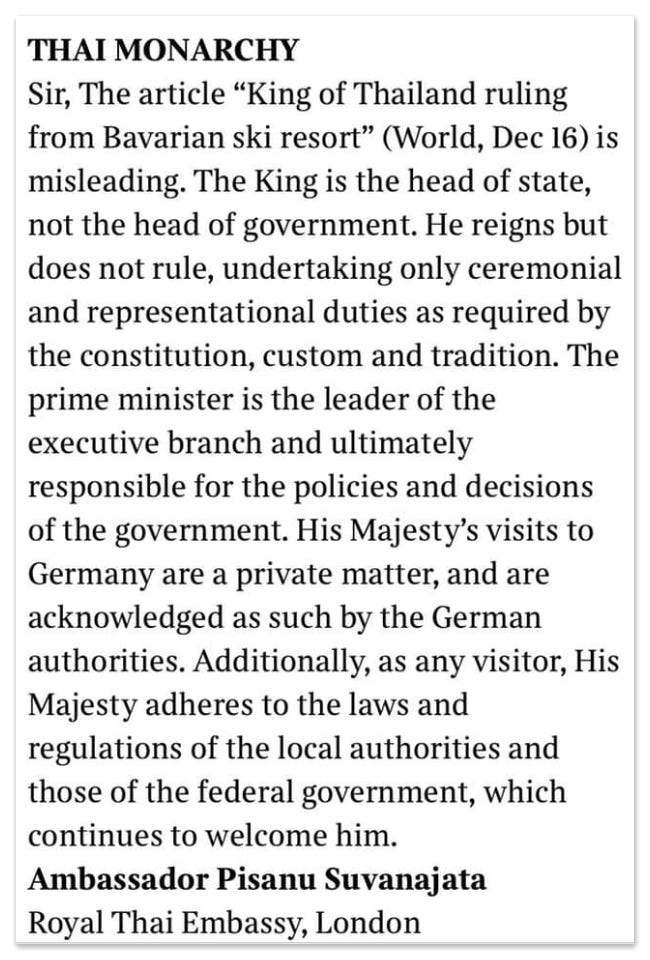
It is so sad to read. This is a great nation of talented people. Versatile and skillful in various fields. This isn’t just restricted to the Diplomatic corps, there are so many through the whole country.
This country is poisoning its society and the speed of social regress is accelerating. The brutal crush of the democratic movement is one example.
Social improvement need innovation, not allowing to speak up freely hinders it in all aspects. Daring and progressive people trying out new ways is what this country needs. Expressing ideas, open and constructive discussion, no matter how challenging those might be there won’t be any progress possible. Social progress is made in an open society - Thailand is heading in the reverse direction!
"What do your children think of you" is a pretty harsh dig at the diplomats. While unlikely to change their course, I do hope this article gets passed around.